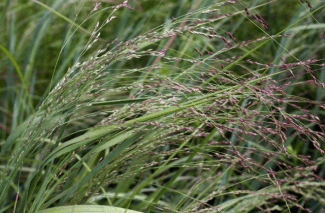
By Hannah Bradshaw
Last year during my internship at the Conservation District, I was reading a watershed management plan in order to research a potential grant application. I came across one very interesting sentence. It said that native grasses, like switchgrass, could be used as biofuel material, and that they would produce more biomass per hectare than corn. This sent me on a deep internet research dive into switchgrass. I obsessed over how we could use it somewhere! I researched the idea along with Hannah Boettcher, a fellow student, and we brought our thoughts to state legislators on several occasions.
Native to Michigan, Switchgrass is a wonder plant. It requires little water, no fertilization, and can thrive in almost any type of soil. In needs only to be planted once every ten to eight years. In addition, it can be easily used as a biomass in several capacities. Biofuel using switchgrass is possible. It first came to the public eye during President George W. Bush’s 2006 State of the Union address, in which he mentioned switchgrass in an unplanned tangent on reducing foreign oil dependence. Switchgrass enjoyed a short time in the spotlight because of this but processing facilities for this type of ethanol are sparse. As such, switchgrass production on a large scale has not taken off, though perhaps it could and should.
Switchgrass is a promising filter strip crop, a strip of land on the border of a farm field or between two sections of field that prevents some runoff and offers wildlife habitat. As it is native to Michigan, switchgrass filter strips would likely provide quality habitat for native wildlife and insects. Switchgrass could perhaps even be a winter cover crop, a crop planted in winter to prevent soil erosion and runoff. Cover crops have also been known to increase crop yields the season following their use.
Though sometimes difficult to incentivize, Michigan’s coal plants provide a unique way to create a market for switchgrass, and by doing so, encourage the use of it in various conservation practices. Michigan’s coal plants are all scheduled to be closed by 2040, to be replaced by mostly natural gas plants. That still leaves over two decades of carbon emissions, of which coal processing makes 35.8% of total carbon emissions in the State of Michigan. A reduction of almost 30% of greenhouse gas emissions can be achieved by retrofitting Michigan’s remaining coal plants to adapt them to co-fire switchgrass with coal. At a ratio of 20% switchgrass biomass to 80% coal, it would only cost said coal plants $50,000-$400,000 to adapt to process switchgrass biomass, with an average cost of $200,000 for the average coal plant.
Not only does Switchgrass offer opportunities for reducing greenhouse gas emissions with coal, it also provides some ways to reduce the economic disparities between Michigan’s Upper and Lower Peninsulas. The Upper Peninsula is not only home to most of Michigan’s coal plants, and therefore bears the brunt of the pollution from them, but it also one of the most economically disadvantaged areas of the country. Renewables have not taken hold in the area because of prohibitive costs and reliability issues. This means that the area lags behind the rest of the state in terms of renewable energy and that energy costs will eventually skyrocket as the amount of coal and oil is finite.
Switchgrass can also be grown in the Upper Pennisula, where crop options are differ greatly from downstate. With most coal plants located in Northern Michigan, the area’s farmers could also grow most of the switchgrass needed by coal plants for cofiring, thus furthering the economic benefits of switchgrass for the area all while reducing soil erosion, irrigation needs, and fertilizer runoff.
Co-firing switchgrass with coal is both cost-effective and reliable, and would provide a more environmentally friendly source of energy for the UP without raising prices to consumers. Growing switchgrass is by no means a comprehensive solution to the area’s energy crisis, but it offers a meaningful transition to renewable energy, one that is certainly needed.